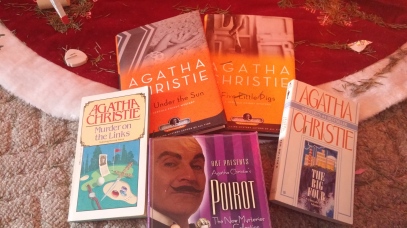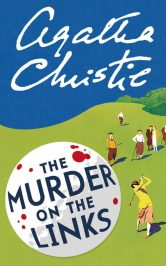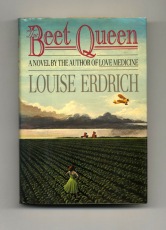Memorial Day weekend in a North Woods cabin: restful, right? Lots of time to write surrounded by nature and all its spring glory, riiiight?
Well when one spends a long, rainy weekend with in-laws and three hyper-active children in a space roughly the size of a one-bedroom apartment, “restful” does not come to mind.
Thankfully, parenthood has given me the ability to read despite screams and comfy animal battles about my legs and thrown cars and training potties full of urine positioned in dangerous places upon the floor, so I decided to allow myself some time with a couple mysteries Bo gave me at Christmas:

At the outset, the titles didn’t strike me as anything unusual. Christie’s titles always connected to the story, so I was sure that when I opened up The Big Four, I would indeed be reading about a group called The Big Four. Sure enough: the antagonist of the story was a crime syndicate run by a group of bosses known as The Big Four. Poirot saves the planet, everything is awesome, I got to read an entire book in one day, which I hadn’t done in ages. Could I get through another book before the weekend was out?
I began Murder on the Links with high eagerness. I wasn’t planning on doing a close study of these books for this blog–I wanted to read for fun. (Crazy concept, I know.)
But the more I read, a question began to niggle my inner writer. Something felt off about this story. Oh, the plot read plausibly with a strong balance of clues and red herrings. The dialogue was so-so, but not nearly so heavy-handed as Poirot’s Christmas. What the hoobajoob was wrong here?
I closed the mystery, completed, and saw it: the title.
One look at the title, and one expects golf to play a major role in the story. After all, the Nile was quite the set piece in Death on the Nile. Murder in Mesopotamia was as exotic as it sounds. The train doesn’t just fade into the background in Murder on the Orient Express. Murder is definitely committed under the sun; ergo, the title Evil Under the Sun.
Bo noticed my scrunched face as I glared at the golf course on the cover. “What’s wrong?” I explained my niggle. “Well, did the murder happen on the golf course?”
“Yeah.”
“So what’s the problem?”
 And that was the thing, I guess, that really got to me: technically, the title fit. The murder itself occurred on land being turned into a golf course. Christie didn’t fib. Murder did indeed happen on the links.
And that was the thing, I guess, that really got to me: technically, the title fit. The murder itself occurred on land being turned into a golf course. Christie didn’t fib. Murder did indeed happen on the links.
But with the other stories I mentioned, the place was more than just a location. Whatever was mentioned in the title carried influence into the story, be it through the culture, method of crime, strategies of investigation, etc. I thought back to other stories I’ve covered in my “Lessons Learned” posts and their titles–were any lame titles in those?
Howl’s Moving Castle: Heroine Sophie is cursed and seeks help from the Wizard Howl. His castle moves because of a curse between Howl and a fire demon that Sophie promises to break. So, pretty important.
Charmed Life: Cat Chant and his elder sister Gwendolyn are taken on by the great sorcerer Chrestomanci to learn more about magic. There’s more magic in Cat than he realizes, which is finally revealed with his sister’s villainy. By book’s end Cat is destined to be the next Chrestomanci. That’s about as charmed a life as you can get.
Five Little Pigs: Poirot sets out to solve a murder committed 16 years ago. He considers the five living suspects like the five little pigs; the rhyme comes up every time he meets another suspect.
The Name of the Rose: I admit, I had to read a bit more into this one. I knew there was some sort of connection with language, since the mystery fixates upon the danger of language and ideas. How fitting, then, that Eco found a poem reflecting that a thing destroyed is preserved in its name. I found Eco’s own explanation for the title:

Eco states in the Postscript to the Name of the Rose that Bernard’s poem is also the source of the novel’s title and last line —
“Stat rosa pristina nomine; nomina nuda tenemus.”
(Yesterday’s rose endures in its name; we hold empty names.)— meaning that in this imperfect world, the only imperishable things are ideas.
“Since the publication of The Name of the Rose I have received a number of letters from readers who want to know the meaning of the final Latin hexameter, and why this hexameter inspired the book’s title. I answer that the verse is from De contemptu mundi by Bernard of Morlay, a twelfth-century Benedictine, whose poem is a variation on the “ubi sunt” theme (most familiar in Villon’s later “Mais ou sont les neiges d’antan”). But to the usual topos (the great of yesteryear, the once-famous cities, the lovely princesses: everything disappears into the void), Bernard adds that all these departed things leave (only, or at least) pure names behind them. I remember that Abelard used the example of the sentence “Nulla rosa est” to demonstrate how language can speak of both the nonexistent and the destroyed. And having said this, I leave the reader to arrive at his own conclusions.”
With Murder on the Links, however, golf had absolutely nothing to do with the crime. The setting bore no real influence upon the clues, the body, or even how characters moved about the scene of the crime. The course is where the murder just so happened to, well, happen. It could have been on the grounds of the mansion or in the ditch of the freeway–it would have made no difference.
Perhaps that, more than the title, was what bothered me. Or it was because the title gave importance to something that carried none–a red herring from the off.
I remember feeling annoyed like this once before with Louise Erdrich, an amazing American author whose award-winning novel Love Medicine was my one reading joy from those years in graduate school. It was a family drama spanning years–not normally my thing at all, but her portrayals of the Native American life and landscape gripped me from the start. I read more of her work after school, but stopped with Beet Queen. Why?
 Because this Beet Queen chick didn’t show up until the last few pages, dammit!
Because this Beet Queen chick didn’t show up until the last few pages, dammit!
Now granted, I can see now that wasn’t entirely true. The character who grows up to become the Beet Queen–the beauty queen of the town–is born halfway through the book, and the first half of the book is about the family into which she’s born–that’s typical Erdrich. At the time, I couldn’t understand why the title fixated upon that final moment, that social title bought by the girl’s family so that she could feel special at last. Now I can see that the title embodied the desperation of the family to do what it could for the love of this girl, to make her socially acceptable, to make her happy…and how this girl, a rather selfish brat, held it all in contempt. Family drama, spanning generations. The title fit.
Murder on the Links, a fine mystery, has a title that pays heed to the least important aspect of the crime. I suppose being bludgeoned by a five iron or discovering a collection of heads in a caddy’s locker would have all been a bit much, but it’s nice to see titles that connect on more than just a technical level.
What of your title? Does it embody the struggle, the hero, the villain? Does it give a wink and a nudge towards a special clue to reveal the truth? Or does it just hang there, stating its purpose and nothing more? After all, some stories have made such titles work brilliantly for them: The Lego Movie, The Peanuts Movie, The Care Bears Movie, The Lego Batman Movie. But notice how all these titles are a)geared for children using b)easily identifiable toys/characters OF their childhood for c)a visual presentation. Kids know they get to watch Legos, Snoopy, and so on. That’s all they want.
But in stories to be read, we want titles that grip and hold. Don’t warp that grip into a bait-and-switch. What influences the characters? What place affects the plot? What taunts your hero from afar, that if he could just push himself a little bit more, he can touch it, taste it, know it? Your answers hold the key to a title of relevance, spirit, and strength.

I’m on home territory here and agree with all you say. The best bit about writing a song is when, when it’s all done I get to choose a title. I hate working with a title until it’s all over. Mostly titles should reflect the lyric, but sometimes, just sometimes something unusual happens and the link to the lyric is there, yet the listener has to think about it. They are the best titles of all.
LikeLiked by 1 person
Oh yes. Oh yes, those are really the best titles.
LikeLiked by 1 person
Oh yes! And it’s why I sweat blooood over my titles and normally wake up with a ‘hurrah!’ moment at 3 am when the right title FINALLY blazes across my inscape:)). Great article, Jean. And I agree about Murder on the Links – it ends up short-changing us and that is something a title should NEVER do…
LikeLiked by 1 person
Yes, Sarah, exactly that! I want a title to be a legit preview, not some…yeah, what Murder on the Links was. I actually keep a notebook by the bed for just such 3am epiphanies. 🙂 Thanks for stopping by, Friend! xxxxx
LikeLiked by 1 person
Absolutely! Have a great week-end, Jeanxxx
LikeLiked by 1 person
I aye say you should be able to tell the book from the title x
LikeLiked by 1 person
I know, right?
LikeLiked by 1 person
Yep yep. The titel does not have to be fancy. Just what a book is about . xx
LikeLiked by 1 person
I love your analysis there. I HATE coming up with titles. That is all.
LikeLiked by 1 person
Yeah, I kinda stink at them, too. But at least I know what DOESN’T work. 🙂
LikeLike
Which is half the battle, my friend! And I think “Middler’s Pride” and “Beauty’s Price” work very well for your stories- concise, but they roll off of the tongue and catch the main theme. I have a long notebook page full of awful titles that the man and I had fun working up. I think my favorite is still “Whence Thence Amongst the Trillium”- his brain child, not mine. No, there are no trillium in the book…
LikeLiked by 1 person
LOL! Bo loves making up band names. I need to get a notebook to start recording them. 🙂 Actually, Middler’s Pride came super fast, as did the 4th book’s title, and the 3rd. Beauty’s Price took FOREVER. I wanted Beauty ____, but nothing else seem to fit until after I finished Middler, and had that bit with Wynne giving the villager all her expensive dates for provisions. Someone was trying to buy her off…AHA! 🙂
LikeLike
I wonder if that’s the original title Christie meant for that book or if the publisher chose it.
LikeLiked by 1 person
That’s a great question! You can tell which cover designers actually read the book and which did not; I found a few covers showing a victim bound and gagged without a hint of golf at all. THAT happens in the book, twice. Since this book is pretty early in the Poirot canon, I bet you’re right that Christie might not have had much say over titles and covers and things yet.
LikeLiked by 1 person
It’s always a consideration. I know a few published authors who have complained bitterly about the final title. Same goes for cover art created by people who never read the book.
LikeLiked by 1 person
Oh how awful! Why on earth the authors aren’t given at least an iota of control over such things is beyond me.
LikeLiked by 1 person
Sadly, I can’t get the audio as he’s doing things on his PC and my left eye isn’t doing what left eyes should do. At least I now remember my defeat when fighting the polished granite floor…I even recall my name. I think I’m back in the game, and enjoying a cup of fine coffee, Ms Lee! How are you by the way.
LikeLiked by 1 person
My son launched himself from our spot on the ferris wheel and hit the concrete. To be clear, we had stopped, and it was our turn to get off, but still, it was a three-foot fall from the ramp he did NOT step on, and it took six stitches to mend the gash in his head. So….not anything like you, Sir, but it was still a damn long day. Glad you like the coffee. 🙂
LikeLiked by 1 person
Poor little chap. I do trust he is mended completely. I always shed a tear when kids get hurt. Generally, they bounce back much quicker than adults. I saw a little guy in Fontainebleau a week or so back take a fall after running barefoot through the fountains in the town square. He fell flat on his face…a thing that would likely have broken endless bones in someone my age…however, with me ready to call for an ambulance he simply got up, checked himself over, an ran off!
LikeLiked by 1 person
Oh yes, these boys of mine live up to their names. They’re still running in the house, launching out of the car, running around precarious edges…I wish God would lend me some guardian angel wings so I could keep up, at least until the stitches come out!
LikeLiked by 1 person
One of my 4 kids was a bit like it on the fearless front. He’s a policeman now. There’s not much you can do when they no not the logic of fear. Best of luck and I hope they stay safe as possible…until next time. With kids there’s always a ‘next time’!
LikeLiked by 1 person
Good Lord, don’t I know it! With Bash biting it in June and Biff in July, we’re going to bubble-wrap Blondie through August so we can finish this summer withOUT more stitches!
I’ve often wondered if the boys will follow a similar path as your son. One of Bash’s favorite movies is about firefighters; as scared as the thought makes me, I can see him joining that profession as soon as age allows.
LikeLike
Pingback: Sunday Post – 2nd July 2017 | Brainfluff
I’m always honored when I make your list, Sarah. Thank you so much! xxxxx
LikeLike
I’m insecure about so many things that a list naming them all would comprise a novella….possibly a full-length book. However, my darling Java Jean, I’m secure with my book title! It’s a miracle!
I’m a fan of alliteration (it has that), I love unique titles (as far as I know, my book is the only one with its title), and I’m just into it…..what more can I say? 💖 Or write? Well, a lot more, but someone’s sweet tooth beckons…..
p.s. Did you change your header and include that gorgeous picture of you smiling or has it been there for months??????
LikeLiked by 1 person
LOL! Those header pics are on rotation, so my head might not have popped up for a while. 🙂
But I agree on unique titles–I love titles that MEAN something, or at least relate, you know? But some titles are so quirky–like PRIDE AND PREJUDICE AND ZOMBIES–that you’re drawn to the book, but then the problem is that if the book doesn’t match that quirkiness, readers feel jipped. So I’m glad you’re not going the quirky route with yours–your title is perfect just as it is, Lady of the Bean SpyDy! xxxxxxxxxxx
LikeLike
My title is ‘The Education of Ryan Gregori,’ which is both a mouthful and borderline pretentious. I’ve tried and tried to change it, but it just refuses to let go. It’s a new adult coming of age story about grief, identity, self love, betrayal. . . Turns out it fits perfectly, it just doesn’t pop!
So what’s a writer to do when the title fits but doesn’t sizzle?
Lovely read! I’m glad we could connect. 😊
LikeLiked by 1 person
Hey, some titles aren’t meant to have sparkles and pop. Sometimes we need the lure of simple elegance. 🙂
Take your title: We immediately know we’re to get a coming-of-age of sorts, a growing of sorts, but there’s something unique in the contrast of the name: the modern feel of Ryan with the monastic feel of Gregori. I think your title’s brilliant. 🙂
Thanks for reading!
LikeLiked by 1 person
Aw, you’re sweet! I’ll look forward to reading more!
LikeLiked by 1 person
Pingback: Lessons Learned from Agatha Christie: Even a B Novel Should Have an A Title. | Jean Lee's World
Maybe I am completely naive. I always thing that the title is the very last thing you should do. Completely focus on the story and the images. When it is finished the title will jump out at you. If it doesn’t then ditch the story or at least change it.
LikeLiked by 1 person
I’m hoping you’re right, because I still don’t feel happy about a couple WIP titles I have…
LikeLiked by 1 person